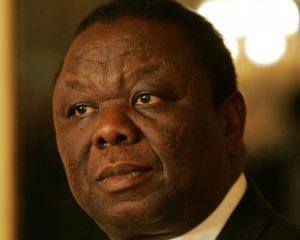
By Edgar Gweshe
Zimbabwe’s main opposition, the MDC-T, has been hit by internal power struggles that have seen a number of senior officials including the party’s secretary general, Tendai Biti and deputy treasurer-general Elton Mangoma parting ways with party leader, Morgan Tsvangirai.
Zimbabwe Exiles Forum (ZEF) chairperson, Gabriel Shumba said the developments in the MDC-T were retarding progress towards democratic change in the country and consequently dampening hopes of exiles returning to Zimbabwe.
He blamed some officials within the MDC-T for working towards self-aggrandisement at the expense of the people’s interests.
Shumba said that as a result, people were beginning to lose faith in the struggle for democracy in the country and predicted that many more Zimbabweans would leave the country.
“The current squabbles starkly indicate the danger that the GNU posed at its very beginning: A mutation of values of selflessness and loyalty to party into egocentricity and self-aggrandisement,” he said.
“The current democratic revolution is thus being compromised, and though I think that this is not the end of the MDC or the opposition, I believe the imminent split will herald new hopelessness.”Shumba said a lot still needed to be done to restore the people’s faith in the people’s struggle.
- Chamisa under fire over US$120K donation
- Mavhunga puts DeMbare into Chibuku quarterfinals
- Pension funds bet on Cabora Bassa oilfields
- Councils defy govt fire tender directive
Keep Reading
“Many in exile are depressed by their helplessness. They need to participate in electoral processes. I don’t see many coming home soon, but I see more leaving,” he said.
Over three million Zimbabweans are estimated to have flocked to neighbouring countries as well as overseas at the turn of the millennium due to political as well as economic reasons.
Shumba said there was need for the leadership of the MDC-T to make efforts to bring all democratic forces in the country back to the drawing board after last year’s disputed elections, won by President Robert Mugabe.
The MDC-T United Kingdom treasurer, Taurai Chamboko said developments in Zimbabwe were a pointer that the time for the return of exiles “might never come”. He implored the government to be accommodative of exiles wishing to come back home saying many of them had acquired skills that could be helpful in the country’s economic turnaround strategies.
“We must help build Zimbabwe and for this to be more effective, the government of Zimbabwe should be accommodative of those in the Diaspora or even coordinate our return home. We have been waiting for a conducive time and we are realising such a time might never come. Many of us attained some qualifications and experience which will be of great use to the development of our country,” Chamboko saidSelf-exiled novelist, Chenjerai Hove, now based in Norway, recently said current developments in Zimbabwe had made his returning home difficult. He said he would only come back when change happens in the country.
Hove fled Zimbabwe in 2001 following his widely publicised criticism of President Robert Mugabe at a time the government had launched a clampdown against perceived opponents.
Former Zimbabwe cricket player, Henry Olonga, who fled the country in 2003 after a protest against the death of democracy in Zimbabwe also recently bemoaned the high levels of poverty among children as well as lack of health care in the country while speaking about his plans to fundraise for Mathew Rusike Children’s home in Epworth.









